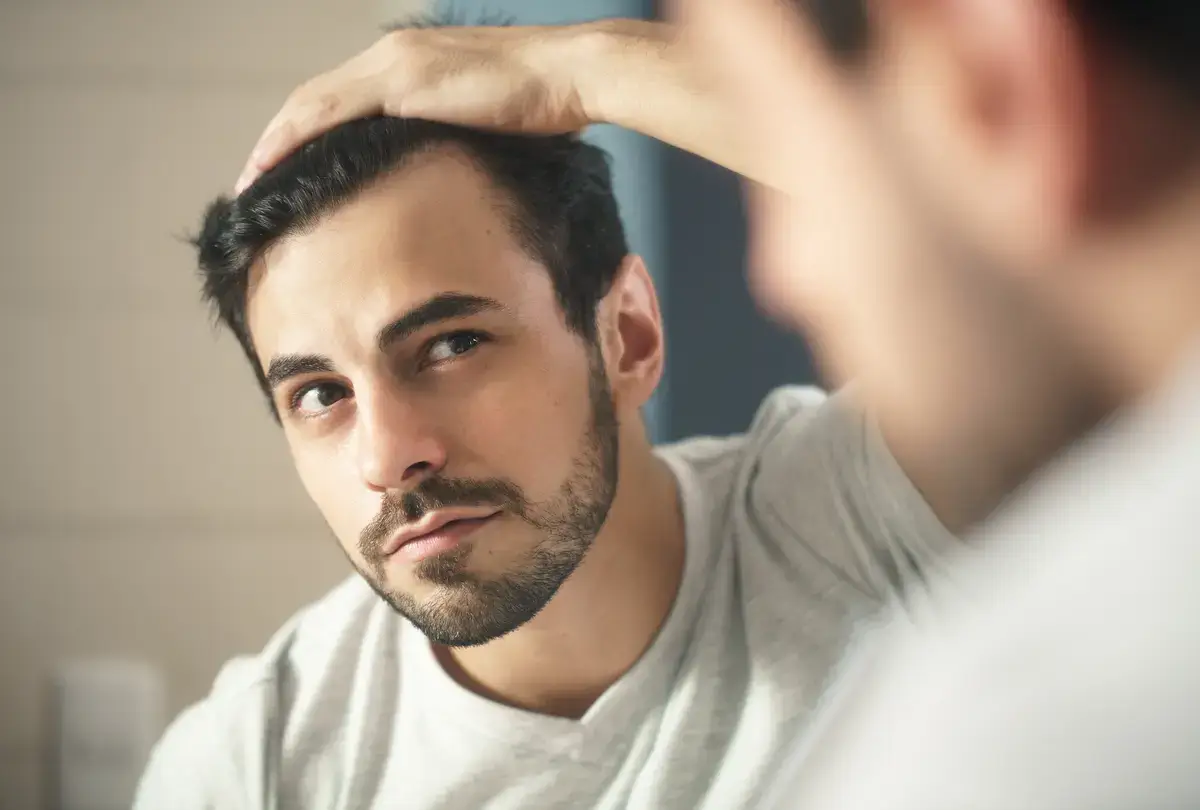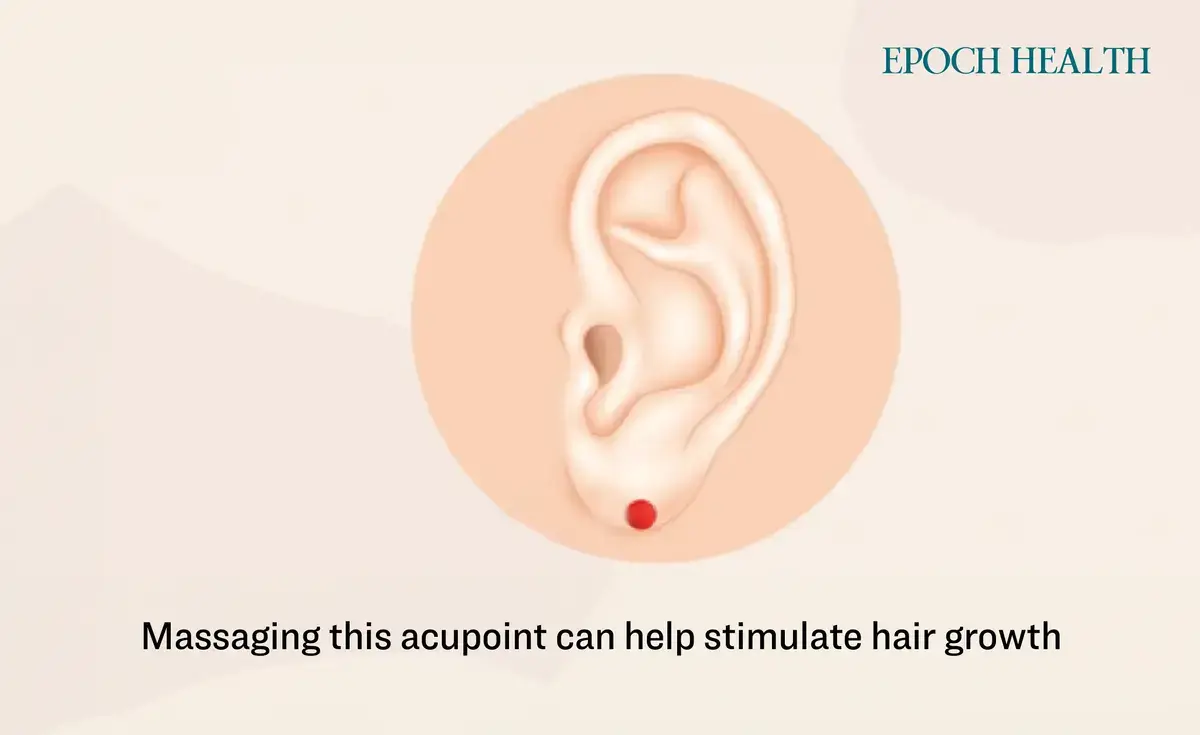
3 Ancient Approaches For Addressing Hair Loss & Baldness
Even with the “baldness gene" one may achieve a healthy head of hair.
By: Naiwen Hu | The Epoch Times
Some people experience hair loss at a very young age. Is baldness inherited? I was once asked by a patient, “My dad and grandfather are both bald. Will I also go bald in the future?” Well, it is certainly a possibility. So, how can one prevent baldness?
Assessing The Presence of The ‘Baldness Gene’
Take a look at the hairline above the temples. If it is receding upwards, it indicates the presence of the “baldness gene.” However, having the baldness gene does not necessarily mean immediate or inevitable baldness. In addition to genetics, male hormones also contribute to the development of baldness.
The human body maintains a balance of male and female hormones. Generally, men have higher levels of male hormones and lower levels of female hormones, while women exhibit the opposite pattern.
If a man carries the baldness gene and has an elevated level of male hormones in his body, he is more susceptible to hair loss and baldness. Most young men around the age of twenty boast thick and abundant hair, even if they exhibit a receding hairline. However, as they enter their forties, when the proportion of female hormones in their bodies is at its lowest, hair loss becomes noticeable. Therefore, it is quite common for men to start experiencing baldness around the age of forty.
Some women, around the age of fifty, particularly after menopause, are more prone to experiencing hair loss. This is often due to genetic factors, as well as a decrease in female hormones and an increase in male hormone levels.
3 TCM Approaches To Improve Hair Loss & Prevent Baldness
- Siwu Decoction To Prevent Hair Loss
In TCM, it is believed that “hair is the surplus of blood.” Siwu decoction can nourish yin and replenish blood, as well as enhance the secretion of female hormones, thus promoting hair growth.
Ingredients
- Angelica sinensis: 15g
- Ligusticum chuanxiong: 15g
- White peony root: 15g
- Rehmannia root: 15g
- Half a hen
Preparation
Simmer the ingredients for 60 minutes to prepare as a chicken soup, add seasonings according to taste preferences.
Drinking Siwu decoction can improve hair loss issues and promote hair growth. It is suitable for both men and women.
It is advisable for women to drink Siwu decoction after each menstrual cycle. This helps reduce blood stagnation in the uterus and alleviates pain.
- Regulate Emotions & Manage Stress
Emotions can also contribute to hair loss. For instance, many people are familiar with a condition known as “alopecia areata,” (psychological baldness) which is referred to as “ghost shaved head” in traditional Chinese medicine.
Alopecia areata is believed to be triggered by severe emotional issues that compromise the immune system, leading to viral infections. Individuals with this condition experience large patches of hair loss, often in circular patterns. Notably, those with alopecia areata typically display problems such as irritability, excessive worry, high emotional stress, and nervousness.
In traditional Chinese medicine, there is a concept known as the “Seven Emotions,” which refers to joy, anger, anxiety, contemplation, grief, fear, and fright. Excessive experiences of these emotions can lead to illness:
- Excessive joy can harm the heart.
- Excessive anger can harm the liver.
- Excessive anxiety and contemplation can harm the spleen.
- Excessive grief can harm the lungs.
- Excessive fear and fright can harm the kidneys.
Therefore, maintaining emotional balance is crucial for overall well-being.
I once had a patient who experienced alopecia areata in his early twenties. When he first visited, his entire head was bald. It took me about six months to successfully treat him, and his hair eventually grew back thick and healthy. However, he returned a few months later, and as I examined his bald head, I could not help but feel puzzled.
I asked: “Why are you bald again?” He told me that he is still very anxious and troubled due to overwhelming stress in relationships and finances, resulting in a recurrence of the old condition.
I have another friend who, about twenty years ago, dealt with tremendous stress from exams, his father’s illness, and his wife’s health issues. Consequently, he developed alopecia areata, and it has persisted until now without recovery.
Interestingly, this friend is a doctor himself, yet he has not been able to treat his own hair loss. Therefore, it seems that, besides medical intervention, effectively managing one’s emotions is crucial for addressing alopecia areata.
- Stimulate Hair Growth & Darkening With Scalp Acupoint Massage
According to TCM, meridians are the channels through which energy flows in the human body. They are responsible for transporting qi and blood— the fundamental substances that constitute and sustain human life—throughout the body. The circulation of qi and blood maintains the balance and stability of various tissues and organs. When there is an imbalance or deficiency of qi and blood in the body, diseases or other conditions may occur.
Acupoints are unique terms in Chinese culture and Traditional Chinese Medicine, referring to locations with numerous nerve endings and blood vessels. In Traditional Chinese Medicine, acupoints are found along the meridians, which are pathways associated with the body’s organs. These points are specific areas where qi and blood gather, flow, and enter or exit. They are considered focal points of energy in the human body. By stimulating the corresponding acupoints through techniques like massage, tapping, and acupuncture, it is possible to treat diseases related to specific organs.
There is an acupoint located on the edge of the earlobe. Pressing it while tapping the scalp with the fingertips not only promotes hair growth but also helps darken the hair.

Targeted Treatment Methods For Illness-Induced Hair Loss
Some people experience baldness due to scalp conditions like ringworm, eczema, and seborrheic dermatitis. These ailments can lead to itching of the scalp and damaged hair follicle cells, ultimately resulting in hair loss.
I had a patient experiencing severe hair loss at the back of the head, specifically behind the Baihui acupoint area. The hair loss was attributed to a fungal infection. I prescribed a formula to dispel wind, eliminate dampness, and clear heat, which alleviated the itching on his scalp. Consequently, his hair regrew, and while the hair on the affected scalp is now a bit shorter, it matches the rest of his hair in appearance.
In TCM, many illnesses are believed to be caused by external forces in the environment. These forces are known as the six external pathogenic factors of wind, cold, summer heat, dryness, dampness, and fire. TCM employs methods such as acupuncture and herbal remedies to expel these external factors from the body, thereby treating various diseases.
Additionally, when washing your hair, refrain from using your fingernails to scratch the scalp. It is advisable to use the pads of your fingers for massaging, even if your scalp feels itchy.
How often should hair be washed? Washing it daily has the benefit of reducing the risk of fungal and bacterial infections. However, frequent washing with shampoos containing preservatives, various fragrances, and other chemicals can damage the hair. Opting for a shampoo with natural ingredients and no preservatives could be a healthier choice for the hair.
Note: Though some herbs mentioned in this article may be unfamiliar, they are generally available in health food stores and Asian grocery stores. It is important to note that treatment methods may vary depending on the individual. Please consult with a health care professional for a specific treatment plan.
* * *
NEXT UP!
Gallbladder Disease Often Comes After Heavy Holiday Meals, Doctor Warns
Most everyone looks forward to a bit of indulgence when holiday meals roll around. Yet for a percentage of the population, discomfort hits about 20 minutes into dinner, and they end up seeing a gastroenterologist within days.
It’s a trend Dr. Daniel Davila, gastrointestinal surgeon at Northwestern University Feinberg School of Medicine, sees every year starting after Thanksgiving.
“Usually this is related to gallstone disease which is not uncommon, particularly in the American population. Gallstone disease is often precipitated by fatty meal exposure,” he told The Epoch Times. “Especially after Thanksgiving, it’s not uncommon for us to see patients coming in to see us because the Thanksgiving meal, which often is fatty, has precipitated either new or worsening symptoms related to gallstones.”
* * *
READ MORE: Why Do Those Who Don’t Drink Alcohol Have Liver Cancer?
Interesting! What Happens When You Eat An Avocado A Day?
Telegram: Stay connected and get the latest updates by following us on Telegram!
We’d love to hear from you! If you have a comment about this article or if you have a tip for a future Collective Spark Story please let us know below in the comment section.
